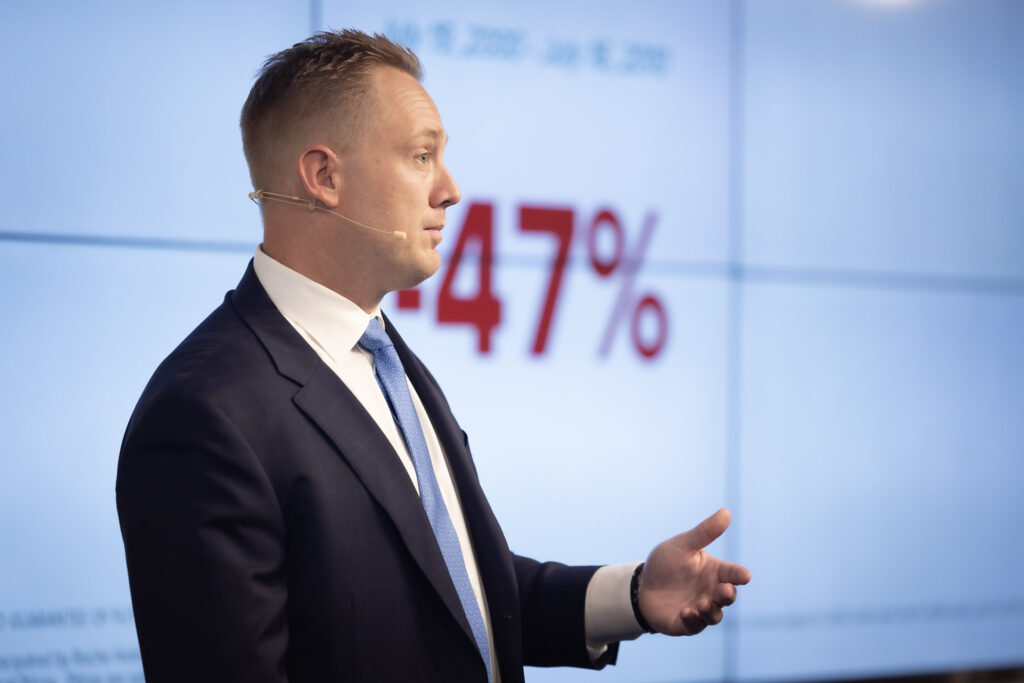
Looking towards the direction the financial industry may be headed, where is the adoption of digital technology fitting into the space? Is paying with cash, having in-person meetings, and even going to an ATM becoming non-existent? Or are those things here to stay but with a twist on technology? Financial activity is already becoming increasingly digitized, placing consumers in the driver’s seat of how they want to manage their finances, especially from the comfort of their own homes, likely challenging all facets of financial institutions to sharpen their technology and expand their remote capabilities.
In a recent survey, over 75% of people who responded stated they preferred to manage their finances using personal finance management tools provided by their main financial provider.1 These tools consist of viewing income over time, budgeting, saving, spending trends, etc., and it was reported that on average, bank customers who use these tools are 18% wealthier than those who don’t.1 Meaning people can be better set up for major life events like home purchases or retirement savings.1 The pandemic also seemed to accelerate certain aspects of digital money and how to manage, monitor, and access it as well. As businesses became increasingly reluctant to handle physical money – financial institutions had to get on board for contactless payment options.2 However, while tapping your card at the store is extremely convenient, other digital ways to bank, invest, or even seek financial advice may not be as user-friendly.
Digital Banking
In 2020, the Paypal-owned Venmo app processed $159 billion in payments, creating a 59% year-on-year increase.2 With that type of astonishing growth, more apps are beginning to enter the world of unsecured lending. But take into consideration that many of these payment apps are not being offered by traditional banks but by tech giants.2 There is also a large difference between payment protection when using credit, debit, or digital payments. The transactions don’t have the same type of fraud protection under federal law. Credit cards lead the pack with the most robust fraud protection, debit cards come in second with protection from scams; however, digital payments have limited protection and there is no recourse for phishing scams or accidental sends.4 As a consumer, it’s important that no matter where your money is going, make sure the right protection is in place and there is an understanding of how it is being handled.
Seeking Social Financial Advice
Seventy-nine percent of Americans that are either millennials or Generation Z have received some type of financial advice from social media and 76% believed that the content they read made it “less taboo to talk about money.”3 However, social media advice also opens the door for potential abuse and can create enormous risks between data security and identity fraud. During Matson Money’s American Dream Experience, Mark Matson talks about families breaking “the no-talk rule” and creating potentially life-altering financial futures. Families, alongside their financial advisor, have an opportunity to redefine their relationship to money in an educated setting, outside the realm of online “experts”. Creating your family’s True Purpose for Money together at an event with a fiduciary can set a standard for what financial coaching means when it comes to long-term wealth creation.
In a 2023 industry overview of financial services, 71% of Generation Zers believe that brands should assist them in achieving their personal goals and aspirations.1 As trends continue to emerge, consumers are seeking financial advice in more places online. According to a report from January 2023, TikTok, Instagram, and Twitter are ranked among the top five social media platforms where young people receive financial information.3 As a cautionary tale, in 2019 a Twitter user began to encourage his followers to buy stocks in which the user had secretly amassed holdings in.3 He would then sell those same stocks at inflated prices as he continued to recommend others to buy them.3 In 2021, the Securities and Exchange Commission (SEC) hit the Twitter user with an injunction and asset freeze for allegedly committing securities fraud with his scheme to manipulate stocks using the popular social media platform.3
Digital Investing Apps
If it’s too good to be true, it probably is. With the gamification of investment trading apps, where you enjoy a world of cartoon people celebrating or each trade getting confetti bursts – the lines have been blurred between investing and gambling. By oversimplifying investing, people are grabbed in and can quickly lose their hard-earned money despite how fun it may feel. In 2021, a popular investing platform agreed to pay almost $70 million to the Financial Industry Regulatory Authority (FINRA) which settled allegations that millions of customers received false and/or misleading information including how much money customers had in their accounts, placing trades on margin, approving risky option trades when it should not have and much more.5 This inaccurate information cost customers millions, which also included multiple system outages and failures that left investors unable to access their accounts during “extreme market volatility.”5
The Opportunity A Financial Coach Can Create
As an investor, do you know your investment goals and risk tolerance? A financial coach can spend time with you and your family and help create an investment strategy that aligns with your financial future and a methodology based on your risk tolerance. While investing apps can be quick and convenient for trading activities, are they aligned with your investment goals? Are online influencers vetted and qualified to provide investment advice and promote their “track record?” Stock picking and market timing are like predicting the future. And as Mark Matson states during the American Dream Experience, “People can’t predict the future, and if they could – they wouldn’t tell you.” Instead, portfolios should be built based on academic investing principles, science, and data.
What should investors consider when looking at financial advisors? Here are questions to consider and remember; verify then trust.
- Are they a fiduciary?
- Are they registered?
- Are they creating social media pitches to buy cryptocurrencies?
- Is the financial advisor working with a third-party custodian?
- Is there a promise or guarantee of extremely high returns on a monthly basis?
- Can you receive GIPS ® audited returns?
- Do they have any fines or penalties with the SEC, FINRA or bank regulators?
Matson Money hosts the American Dream Experience multiple times each year, allowing investors to arm themselves with knowledge. A free, two-day seminar to experience breakthrough financial training and education where investors can discover how to leverage the fundamental principles of long-term wealth creation including telling the difference between Nobel Prize-winning investment strategies versus speculating and gambling with their financial futures.
- Financial Services Industry Overview in 2023: Trends, Statistics & Analysis. https://www.insiderintelligence.com/insights/financial-services-industry/
- The 4 biggest Future Trends in the Financial Sector. https://www.forbes.com/sites/bernardmarr/2022/03/25/the-4-biggest-future-trends-in-the-financial-sector/?sh=114945163bcb
- Two types of worrisome trends emerge in the app landscape that financial advisors must watch out for. https://www.investmentnews.com/bad-app-actors-news-financial-advisors-234025
- https://www.cnbc.com/2021/06/25/mobile-payment-app-complaints-are-surging-as-more-americans-go-cashless.html
- https://www.thisismoney.co.uk/money/investing/article-11420141/Beware-apps-make-investing-look-easy-lose-money.html
DISCLOSURES:
This content is based on the views of Matson Money, Inc. This content is not to be considered investment advice and is not to be relied upon as the basis for entering into any transaction or advisory relationship or making any investment decision.
This content includes the opinions, beliefs, or viewpoints of Matson Money. All of Matson Money’s advisory services are marketed almost exclusively by either Solicitors or Co-Advisors. Both Co-Advisors and Solicitors are independent contractors, not employees or agents of Matson.
Other financial organizations may analyze investments and take a different approach to investing than that of Matson Money. All investing involves risks and costs. No investment strategy (including asset allocation and diversification strategies) can ensure peace of mind, guarantee profit, or protect against loss.
PAST PERFORMANCE IS NO GUARANTEE OF FUTURE RESULTS




